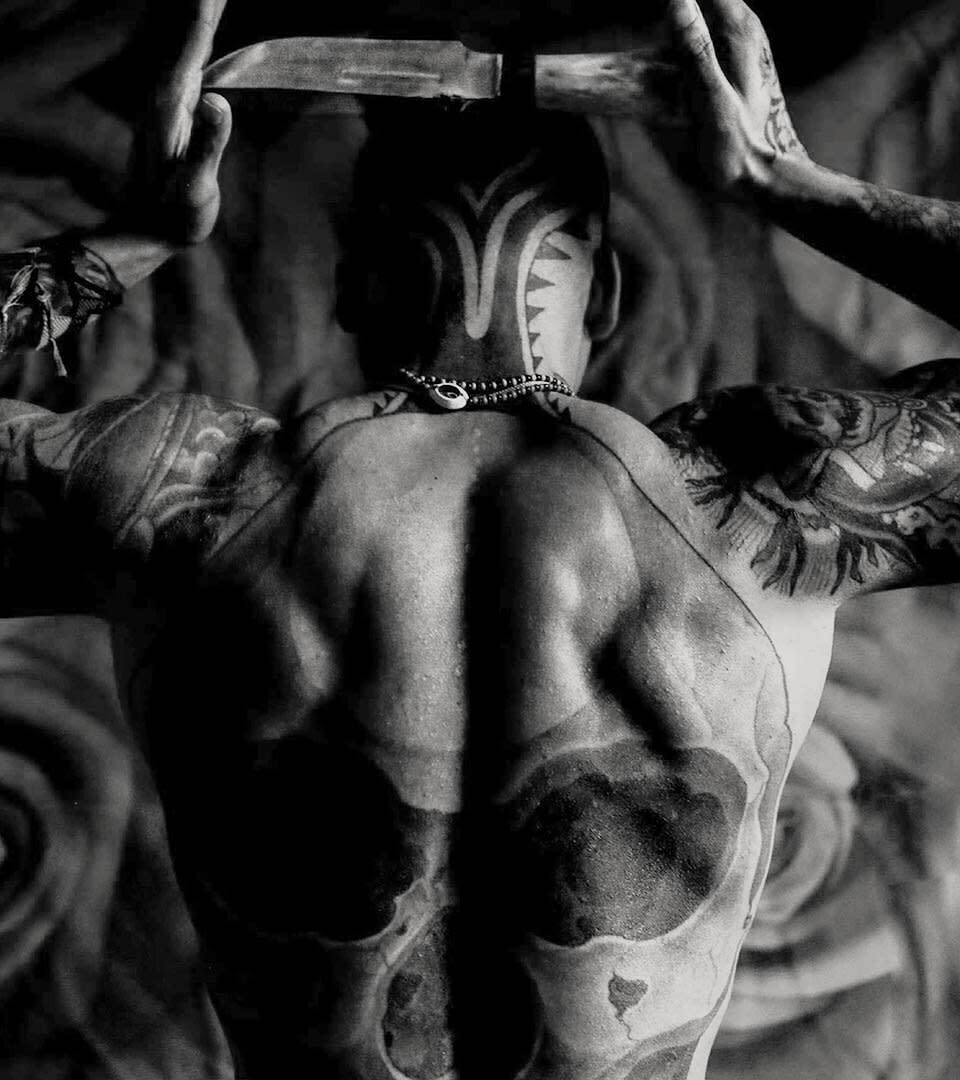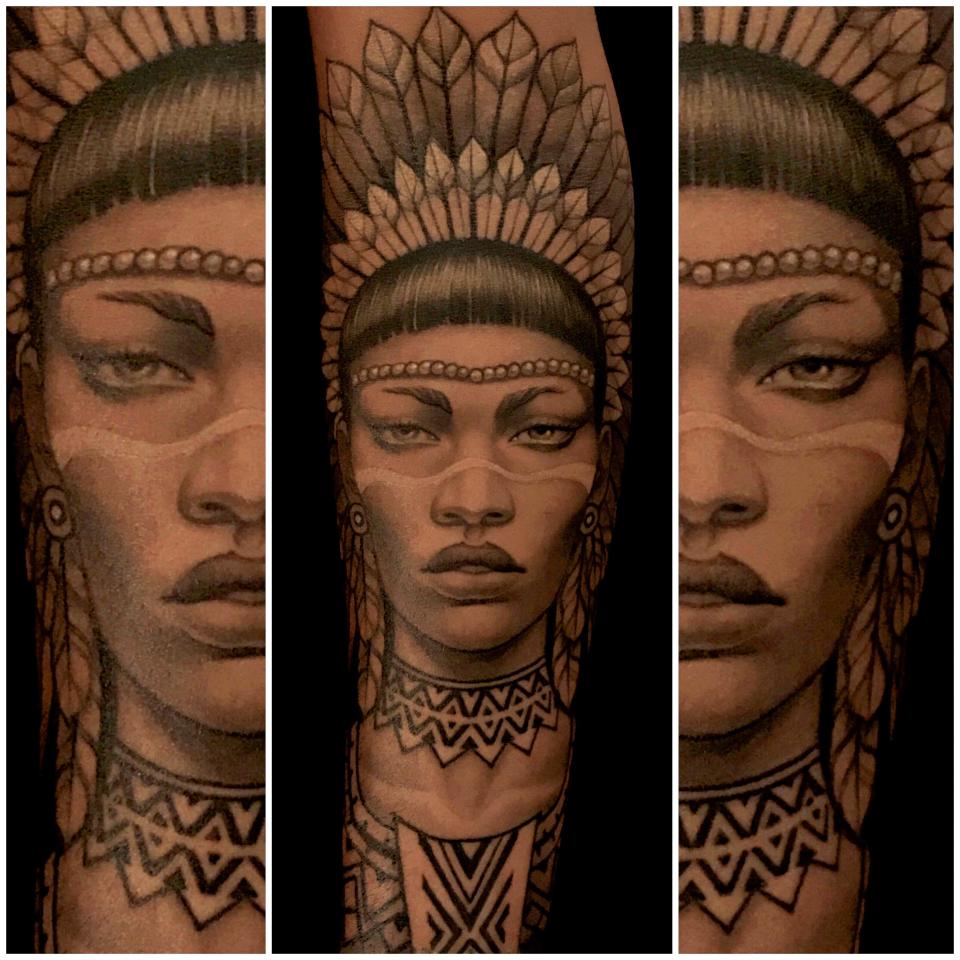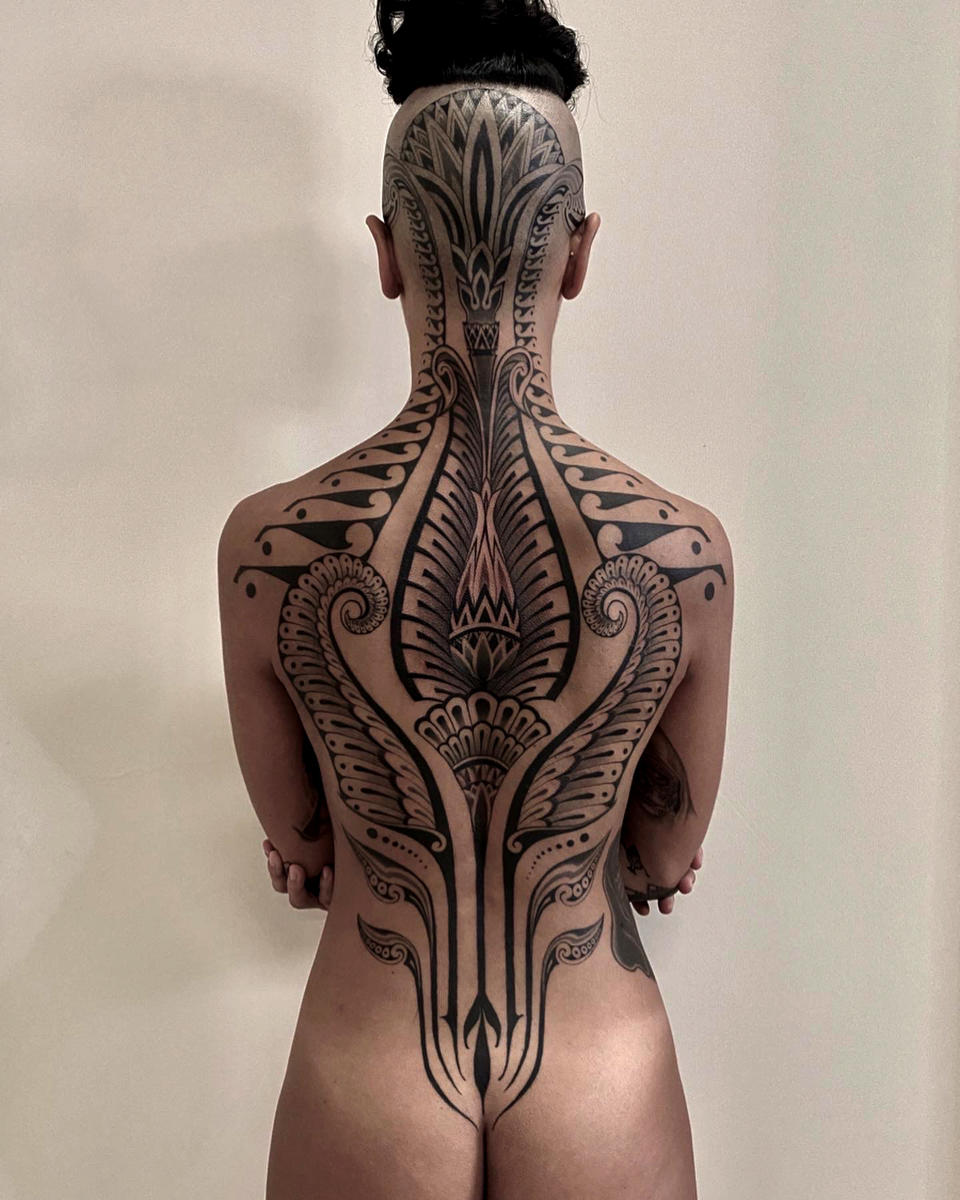Anderson Luna Is Here To Make Tattooing Accessible To Other People Of Color
This profile is part of our series “Quiénes Somos,” which focuses on nine amazing and original creators in the Latinx community. You can read more by visiting our Latinx Heritage Month homepage.
Anderson Luna said the first time he saw people covered in tattoos, he thought, “Whoa, that’s an option?” That wonder and fascination never left the 33-year-old self-taught tattoo artist.
“It’s an honor to be able to do that for someone,” said Luna, who had been wanting to create tattoos since he was a teen. “You see the change in them as well. They become a different person sometimes. I have, for sure.”
Luna, who grew up in the East New York residential neighborhood of Brooklyn, did not have a formal tattoo education and was turned down from apprenticeships. “I was of color, I had cornrows and baggy clothes, and tattoo shop owners were mostly white and were just like, ‘Ewww, no thanks,’” said Luna, who is Black and Dominican.
With the encouragement and oversight of his mentor, tattoo artist André Malcolm, he started tattooing friends in his apartment and eventually landed a job at a Black-owned tattoo shop in Harlem. For the past decade, he’s worked at Saved Tattoo in Williamsburg, Brooklyn. He talked with HuffPost about the power of body modification, what draws him to spirituality, and his dream of starting his own tattoo shop.
Whatcompelsyou to represent thedivine in your work?
I’ve always been interested in spirituality and religion and the imagery behind it. On my own, I would always draw Buddhas or meditating figures. I’ve been meditating since I was a teen and reading on Buddhism and spirituality. I used to be a Christian. My mom converted to Islam when I was a teen; I was practicing with her. I read all of the spiritual texts ― the Torah, the Bible, the Quran. I’ve always been very entranced by that stuff. My favorite has to be the Hindu imagery; it’s just incredible to look at.
People would ask me, “Oh, what kind of stuff do you do?” and I’d be like, “I don’t know.” I wouldn’t know what genre I fell into. And then I just stopped worrying about that. I started not thinking so much about what style I’m doing or trying to make it look like anyone’s, and just trying to be like, “What would I want to wear? How would I want to wear it if I was getting this tattoo?” One day I was putting my portfolio together on my computer. I looked up and everything looked uniform, like it all was made by the same person, like it was all the same language. Which is always what I admire about artists and tattooers ― when they can take any sort of subject matter and make it look like you can tell that person did it. They have their own world they’ve built.

Luna said when people get tattooed, they become a different person sometimes. "I have, for sure," he said.
Can you talk about the power in the body modification aspect of tattooing?
[When André Malcolm was tattooing a large-scale sleeve on me], one day I was getting it filled in and it was going up higher and higher, and I was looking in the mirror, thinking, “Whoa, I look like a different person.” The feeling of modifying yourself and making the decision to do it ― I’ve heard so many people refer to it as psychic armor. It felt very powerful and transformative to take it upon yourself to modify the only thing you have really, this vessel.
As I started getting better and better, and doing larger and larger stuff, I was always trying to play with the form of the body, like, “How does this look from afar? How impactful can it be from afar?” I want it to be seen from across the room. I always try to keep that in mind. I’m modifying this person’s body. I don’t want it to look like texture, like stuff on them. I want it to be readable. The body modification aspect of it is definitely what I love the most about it.
That’s something I consider whenever people are giving up a whole portion of their body for me ― an arm or a back or a front. It’s an honor to be able to do that for someone and choosing me to do that. You see the change in them as well. They become a different person sometimes. I have, for sure.

Luna has always been drawn to spirituality and religion in his life and work. Above, he is pictured tattooing Kali-Ma, the Hindu goddess.
How does your Black and Dominican identity inform your work?
People do come to me for African-style tattoos and images, which I’m very fortunate to get to do. It’s something you don’t really see within tattooing a lot. ... I’m aware of certain images that are out there that I can pull from.
And it definitely makes a lot of my clients comfortable. I know so many people of color, Black people in particular, feel a little bit uncomfortable walking into a tattoo shop, especially given national television shows like “Ink Master,” where they are referring to people as “canvases.” The reason they do that is to essentially dehumanize them so you don’t feel any empathy when they walk away with a shitty tattoo that the judges tear apart.
[Editor’s note: On “Ink Master,” an aversion to tattooing Black skin is repeated throughout the show. In one episode, eventual season winner Steve Tefft says, “I don’t want the dark canvases. ... They take away half your skill set. My stuff is dark and creepy and I don’t want to go that dark on dark skin.”]
Certain things irk me [about “Ink Master”]. If you win a challenge, you can choose your competition’s clients. Whoever wins a challenge always gives [their opponent] the darker-skinned person. You’ll have that [opponent] in the confessional just crying about it, just being so upset about having to tattoo a Black person, like, “Oh, my God, I have to tattoo a Black canvas. Oh, woe is me.” This is being shown on national television. Black people everywhere are seeing this. How could you not expect them to feel a certain way when they step into a tattoo shop where everyone is white in some cases? It just makes me so sad.
In tattooing, the traditional apprenticeship model can involve a pay-your-dues culture and unpaid labor to a tattoo shop. You’ve talked about how this can keep the tattoo industry straight, white and male, because not everyone can afford to undertake an unpaid apprenticeship. Do you continue to see it as a gatekeeping barrier?
You see a lot more people of color [in tattooing now]. The stigma or aversion of being self-taught has gone away somewhat. It’s kind of a secret, but a lot of people are actually self-taught. [Requiring an apprenticeship] is just the way they close the door behind you, to say, “Oh, if you don’t have a traditional apprenticeship model, you’re not legitimate.”
In my opinion, the learning curve is so steep, it takes years to even control the medium. So if you can make it past those first few years of tattooing and get to a place where you’re feeding yourself and making a living tattooing, then I think you deserve to be there. Those first couple of years were really difficult. You lose a lot of sleep, not just [about] making money, but also just trying to get control of this thing that there’s no formal education for.
Even if you do get an apprenticeship, it’s almost like a culture of subservience. You’re made to scrub toilets. You may not even touch a tattoo machine for a year. At least, that’s how it used to be.
“If you walk into a tattoo shop and everyone there is white, there’s probably something going on. Walk out of that place.”
Is the culture of tattooing insular?
I think the general culture within old-school tattooing is to not share information. The general energy is to not let anyone in, to make it really hard to get into. Teaching other people to tattoo is very taboo.
What do you want to focus on next?
I definitely want to start my own tattoo studio. I’d like it to be led by Black women and women of color. I definitely want it to be a space for learning and growing. I’d like to do workshops and make tattooing more accessible for people who feel like they’re having a hard time breaking into the industry.
I’d like to figure out a way to create a coalition between tattoo shops from other states and tattooers of color and make a resource or directory, so we can help each other and build together. I feel like we’ll be stronger together since we’re such ― for now ― a minority within tattooing.
Would you like to start your own shop for that reason, to be that kind of change?
I would definitely love to do workshops, even drawing workshops, tattoo design fundamentals, just to make it not this exclusive. For sure, I don’t think people should be doing tattoos without any experience in their basement of their home or whatever. I think it should be safe and sound, and all that.
But I think people should have access to it. It’s such a viable form of income. A way you can work for yourself and not be trapped under the yoke of capitalism. A lot of these people who are disenfranchised and are coming out of prison, it’s very important to them. They’re interested already, they have the time, they’re already being pushed out of so many other avenues of working. I think people who don’t want [tattooing to become more accessible], they’re purists, they’re worried because they’re obviously not too confident in their own abilities.

Luna said the learning curve for tattooing is steep. "If you can make it past those first few years of tattooing and get to a place where you’re feeding yourself and making a living tattooing, then I think you deserve to be there," he said.
Courtesy Anderson Luna
Do you have advice for people from underrepresented groups who want to get into the tattoo industry?
Be following tattoo artists of color and listening to what they have to say. Be vigilant. You may be hired for representation, but then the culture in the shop is still very anti-Black. There are organizations like Ink the Diaspora that are bringing light to this sort of thing.
I think being aware of that is most important, not feeling like apprenticeship is the only way to go. There’s a way to get advice and assistance from tattooers and there’s more information out there with YouTube. Try to not get discouraged because there is so much to get discouraged about in tattooing, especially in the beginning. Be aware about what you’re up against. I think naïveté will get you in trouble.
Just try and be aware that [tattoo artists who are not supportive of Black tattooers and tattooers of color] have, for a long time, been a lot of the voices in the room. Even though that’s dwindling, they are still trying to hold on. Try and build relationships with other tattooers of color and other people that you think you can trust. If you walk into a tattoo shop and everyone there is white, there’s probably something going on. Walk out of that place. Don’t support them. Don’t patronize that place. I think everyone should feel that way about it if they want it to shift. And when you get the opportunity to then teach and bestow whatever you’ve learned on someone else, make sure it’s the right kind of person. The only way to shift things is the demographics have to shift themselves.
Is there a work in particular you want to highlight?
I really like the one I did recently (below). I want to go in that direction, of doing more black work and doing more design-oriented stuff.

Luna's recent tattoo on his partner Siara Mencia represents the design-oriented direction he wants to go in next with his work.
Courtesy Anderson Luna
I think that’s really impactful and it looks more like body modification. It still has the cultural elements. It’s Egyptian-inspired. In the future, that’s what I’m going to be trying to do, go more in an ornamental direction where it may be derived from shapes, or patterns may be derived from a certain culture, but it’s more about how these shapes and forms are going along the body, as opposed to an image like a face or whole figure. It makes it more about the person and the orientation of the design on them, as opposed to being more about the design.
This interview has been edited and condensed for clarity and length.

